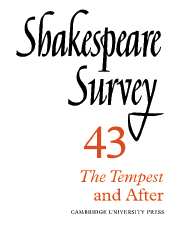Book contents
- Frontmatter
- The Power of Magic: From Endimion to The Tempest
- Reading The Tempest
- The Latter End of Prospero’s Commonwealth
- Henry VIII and the Deconstruction of History
- The Politics of Conscience in All is True (or Henry VIII)
- Shakespeare’s Romantic Innocents and the Misappropriation of the Romance Past: The Case of The Two Noble Kinsmen
- The Hand of John Fletcher in Double Falsehood
- ‘The Duke my Father’s Wrack’: The Innocence of the Restoration Tempest
- ‘Remember/First to Possess his Books’: The Appropriation of The Tempest 1700-1800
- The Tempest and After
- Poetry’s Sea-Changes: T. S. Eliot and The Tempest
- The New Function of Language in Shakespeare’s Pericles: Oath versus ‘Holy Word’
- The Discovery of The Rose Theatre: Some Implications
- The Origins of the Roxana and Messallina Illustrations
- Recycling the Early Histories: ‘The Wars of the Roses’ and ‘The Plantagenets’
- Shakespeare Production in England in 1989
- Professional Shakespeare Productions in the British Isles, January-December 1988
- The Year's Contributions to Shakespeare Studies: 1 Critical Studies
- 2 Shakespeare’s Life, Times, and Stage
- 3 Editions and Textual Studies
- Books Received
- Index
Reading The Tempest
Published online by Cambridge University Press: 28 March 2007
- Frontmatter
- The Power of Magic: From Endimion to The Tempest
- Reading The Tempest
- The Latter End of Prospero’s Commonwealth
- Henry VIII and the Deconstruction of History
- The Politics of Conscience in All is True (or Henry VIII)
- Shakespeare’s Romantic Innocents and the Misappropriation of the Romance Past: The Case of The Two Noble Kinsmen
- The Hand of John Fletcher in Double Falsehood
- ‘The Duke my Father’s Wrack’: The Innocence of the Restoration Tempest
- ‘Remember/First to Possess his Books’: The Appropriation of The Tempest 1700-1800
- The Tempest and After
- Poetry’s Sea-Changes: T. S. Eliot and The Tempest
- The New Function of Language in Shakespeare’s Pericles: Oath versus ‘Holy Word’
- The Discovery of The Rose Theatre: Some Implications
- The Origins of the Roxana and Messallina Illustrations
- Recycling the Early Histories: ‘The Wars of the Roses’ and ‘The Plantagenets’
- Shakespeare Production in England in 1989
- Professional Shakespeare Productions in the British Isles, January-December 1988
- The Year's Contributions to Shakespeare Studies: 1 Critical Studies
- 2 Shakespeare’s Life, Times, and Stage
- 3 Editions and Textual Studies
- Books Received
- Index
Summary
My subject is The Tempest - how it has been read recently and how it might be read otherwise. My vehicle for approaching this subject is the poetic style, its most minute formal details. My immediate purpose is to read The Tempest in a way that offers an alternative to, and an implicit critique of, certain readings produced by American New Historicism and British Cultural Materialism. My larger aim is to discover uses for stylistic criticism that will reassert the value of textuality in a nontextual phase of criticism and that may contribute to the reconciliation of text and context, the aesthetic and the political.
It will come as no surprise to anyone who has followed developments in Renaissance studies that treatments of The Tempest seldom concern themselves with the verse. Recent criticism looks beyond textual details and formal properties to concentrate on cultural surroundings, addressing the play almost solely in terms of social and political contexts, particularly its relation to colonial discourse. The essay by Francis Barker and Peter Hulme in John Drakakis' Alternative Shakespeares is typical: 'The ensemble of fictional and lived practices, which for convenience we will simply refer to here as “English colonialism”, provides The Tempest's dominant discursive “contexts”. We have chosen here to concentrate specifically on the figure of usurpation as the nodal point of the play's imbrication into this discourse of colonialism.' If American New Historicists seem slightly less virulent than British Cultural Materialists, their concerns are scarcely less political and their methods similarly contextual.
- Type
- Chapter
- Information
- Shakespeare Survey , pp. 15 - 28Publisher: Cambridge University PressPrint publication year: 1991
- 5
- Cited by

